The First Church in Swampscott, Congregational is so named because it was the first church established in town. This lovely seaside community, which the native Americans called “M’squ’ompskut,” — which means “Standing Red Rock,” was settled by the English Puritans in 1629.
In 1845, the Reverend Jonas Bowen Clarke began holding services in the Redington Street schoolhouse. On July 1846, he organized First Church with 13 charter members and four years later dedicated the original Romanesque structure on Blaney Street. In 1852, Swampscott, spurred by the young church, became a town separate from Lynn. The Burrill Street colonial style church was dedicated in January, 1926. Development of the Monument Avenue site began with the Fellowship House, in 1955, and the present New England colonial church was completed in 1967.
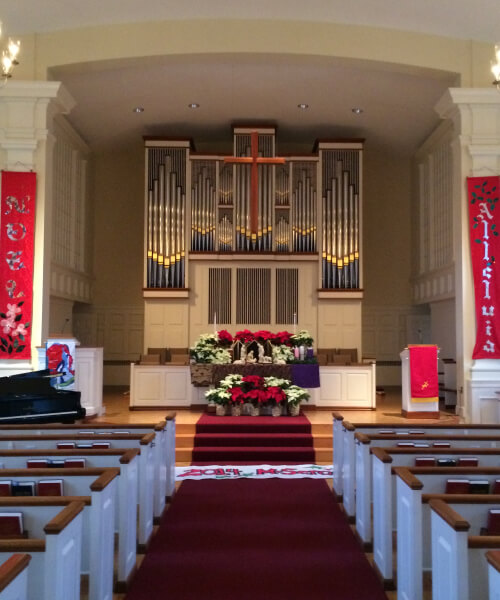
The United Church of Christ came into being in 1957 with the union of two Protestant churches or “denominations.” They were the Evangelical and Reformed Church and the Congregational Christian Churches.
The Congregational Churches were organized when the Pilgrims of Plymouth Plantation (1620) and the Puritans of the Massachusetts Bay Colony (1629) acknowledged their essential unity in the Cambridge Platform of 1648.
The Christian Churches sprang up in the late 1700s and early 1800s in reaction to the theological and organizational rigidity of the Methodist, Presbyterian and Baptist churches of the time.
The Reformed Church in the United States traced its beginnings to congregations of German settlers in Pennsylvania founded from 1725 on. Later, its ranks were swelled by Reformed immigrants from Switzerland, Hungary and other countries.
The Evangelical Synod of North America traced its beginnings to an association of German Evangelical pastors founded in 1841 in Missouri. The Synod reflected the values of a union in 1817 between Lutheran and Reformed churches in Germany.
Through the years, other groups such as American Indians, Afro-Christians, Asian Americans, Pacific Islanders, Volga Germans, Armenians and Hispanic Americans joined with one of these antecedent churches. In recent years, members of other traditions—including Roman Catholic, evangelical and Pentecostal Christians—have found a new home in the UCC, and so have gay and lesbian Christians who have been rejected by other churches. The United Church of Christ celebrates and continues to embrace a broad variety of traditions in its common life.
The United Church of Christ came into being in 1957 with the union of two Protestant churches or “denominations.” They were the Evangelical and Reformed Church and the Congregational Christian Churches.
The Congregational Churches were organized when the Pilgrims of Plymouth Plantation (1620) and the Puritans of the Massachusetts Bay Colony (1629) acknowledged their essential unity in the Cambridge Platform of 1648.
The Reformed Church in the United States traced its beginnings to congregations of German settlers in Pennsylvania founded from 1725 on. Later, its ranks were swelled by Reformed immigrants from Switzerland, Hungary and other countries.
The Christian Churches sprang up in the late 1700s and early 1800s in reaction to the theological and organizational rigidity of the Methodist, Presbyterian and Baptist churches of the time.
The Evangelical Synod of North America traced its beginnings to an association of German Evangelical pastors founded in 1841 in Missouri. The Synod reflected the values of a union in 1817 between Lutheran and Reformed churches in Germany.
Through the years, other groups such as American Indians, Afro-Christians, Asian Americans, Pacific Islanders, Volga Germans, Armenians and Hispanic Americans joined with one of these antecedent churches. In recent years, members of other traditions—including Roman Catholic, evangelical and Pentecostal Christians—have found a new home in the UCC, and so have gay and lesbian Christians who have been rejected by other churches. The United Church of Christ celebrates and continues to embrace a broad variety of traditions in its common life.
We can tell you more about the United Church of Christ with the help of seven phrases from Scripture and Tradition which express our commitments.
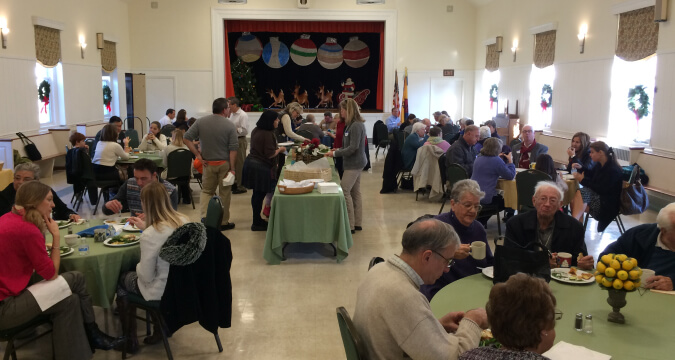
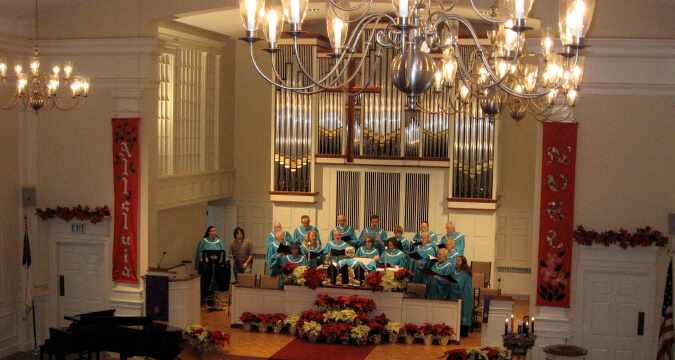
That they may all be one. [John 17:21] This motto of the United Church of Christ reflects the spirit of unity on which it is based and points toward future efforts to heal the divisions in the body of Christ. We are a uniting church as well as a united church.
In essentials unity, in non-essentials liberty, in all things charity. The unity that we seek requires neither an uncritical acceptance of any point of view, nor rigid formulation of doctrine. It does require mutual understanding and agreement as to which aspects of the Christian faith and life are essential.
The unity of the church is not of its own making. It is a gift of God. But expressions of that unity are as diverse as there are individuals. The common thread that runs through all is love.
Testimonies of faith, not tests of faith. Because faith can be expressed in many different ways, the United Church of Christ has no formula that is a test of faith. Down through the centuries, however, Christians have shared their faith with one another through creeds, confessions, catechisms and other statements of faith. Historic statements such as the Apostles’ Creed, the Nicene Creed, the Heidelberg Catechism, the Evangelical Catechism, the Augsburg Confession, the Cambridge Platform and the Kansas City Statement of Faith are valued in our church as authentic testimonies of faith. In 1959, the General Synod of the United Church of Christ adopted a Statement of Faith prepared especially for congregations of the United Church. Many of us use this statement as a common affirmation of faith in worship and as a basis for study.
There is yet more truth and light to break forth from God’s holy word. This affirmation by one of the founders of the Congregational tradition assumes the primacy of the Bible as a source for understanding the Good News and as a foundation for all statements of faith. It recognizes that the Bible, though written in specific historical times and places, still speaks to us in our present condition. It declares that the study of the scriptures is not limited by past interpretations, but it is pursued with the expectation of new insights and God’s help for living today.
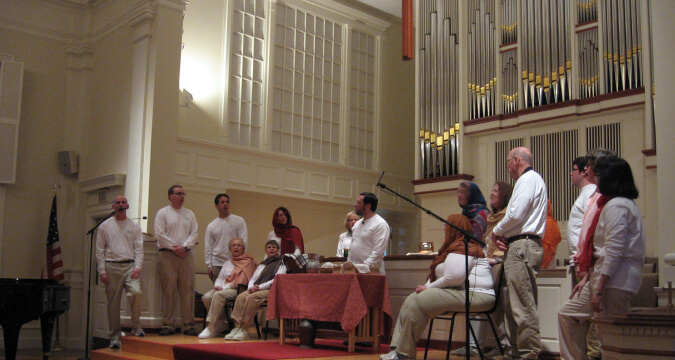
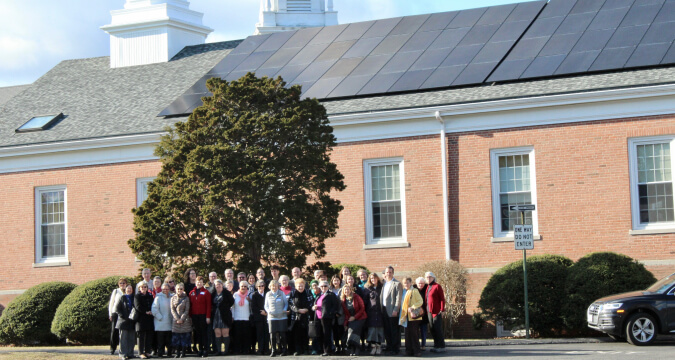
The Priesthood of All Believers. All members of the United Church of Christ are called to minister to others and to participate as equals in the common worship of God, each with direct access to the mercies of God through personal prayer and devotion.
Recognition is given to those among us who have received special training in pastoral, priestly, educational and administrative functions, but these persons are regarded as servants—rather than as persons in authority. Their task is to guide, to instruct, to enable the ministry of all Christians rather than to do the work of ministry for us.
Responsible Freedom. As individual members of the Body of Christ, we are free to believe and act in accordance with our perception of God’s will for our lives. But we are called to live in a loving, covenantal relationship with one another—gathering in communities of faith, congregations of believers, local churches.
Each congregation or local church is free to act in accordance with the collective decision of its members, guided by the working of the Spirit in the light of the scriptures. But it also is called to live in a covenantal relationship with other congregations for the sharing of insights and for cooperative action under the authority of Christ.
Likewise, associations of churches, conferences, the General Synod and the church wide “covenanted ministries” of the United Church of Christ are free to act in their particular spheres of responsibility. Yet all are constrained by love to live in a covenantal relationship with one another and with the local churches in order to make manifest the unity of the body of Christ and thus to carry out God’s mission in the world more effectively.
The members, congregations, associations, conferences, General Synod, and covenanted ministries are free in relation to the world. We affirm that the authority of God as revealed in Jesus Christ and interpreted with the aid of the Holy Spirit stands above and judges all human culture, institutions and laws. But we recognize our calling both as individuals and as the church to live in the world:
This is the challenge of the United Church of Christ.
The characteristics of the United Church of Christ can be summarized in part by the key words in the names that formed our union: Christian, Reformed, Congregational, Evangelical.
We seek to uphold our covenant by worshipping God, accepting Christ into our lives, celebrating the sacraments, guided in our daily lives by the scriptures and the example set forth by Jesus.
Stay connected with us and be a part of our faith community, by subscribing to The First Church E-News.